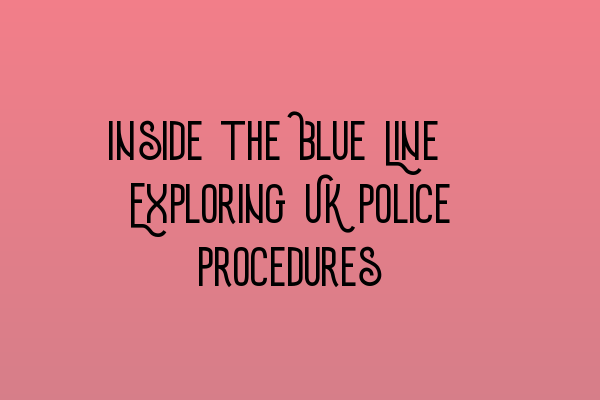Inside the Blue Line: Exploring UK Police Procedures
Welcome to SQE Criminal Law & Practice Law UK, where we provide comprehensive resources and expertise in criminal law and practice. In this blog post, we will delve into the fascinating world of UK police procedures, giving you an inside peek into the workings of our law enforcement agencies. Whether you’re studying for the SQE exams or simply interested in gaining a deeper understanding of criminal law, this article is for you.
Introduction to UK Police Procedures
Law enforcement plays a crucial role in maintaining the safety and order of society. Understanding police procedures is essential for legal professionals and aspiring solicitors alike.
One of the primary objectives of police procedures is to ensure the protection of individual rights while upholding public safety. The procedures followed by UK police officers are designed to maintain a balance between these two objectives.
The Investigative Process
Let’s take a closer look at the investigative process followed by UK police officers. It involves several crucial steps, each contributing to the overall goal of gathering evidence and securing convictions.
- Initial Response: When a crime occurs or a report is made, the police respond promptly to assess the situation and identify any immediate threats. This initial response sets the foundation for subsequent investigations.
- Evidence Collection: Collecting evidence is a vital aspect of police procedures. It includes gathering witness statements, conducting interviews, collecting physical evidence, and documenting the crime scene. This evidence forms the basis of any criminal case.
- Forensic Analysis: Forensic analysis plays a pivotal role in modern criminal investigations. Technological advancements have revolutionized the way evidence is analyzed, allowing for more accurate and conclusive results.
- Arrest and Detention: If there is enough evidence to suggest a suspect’s involvement in a crime, the police can make an arrest. The suspect is then placed in police custody, where their rights, including the right to legal representation, are upheld.
- Interview and Interrogation: During the interview and interrogation process, the police gather further information from the suspect. It is vital to conduct these processes in a fair and lawful manner, respecting the suspect’s rights.
- Charging and Court Proceedings: Upon completing the investigation, the police pass the gathered evidence to the Crown Prosecution Service (CPS) for consideration of charges. If charges are filed, the case proceeds to court, where the evidence is presented, and the defendant has the opportunity to defend themselves.
Training and Professional Development
UK police officers undergo rigorous training to ensure they have the necessary skills and knowledge to carry out their duties effectively. This training covers various areas, including criminal law, evidence collection, interview techniques, and the use of force.
Continuous professional development is also a crucial aspect of police procedures. Officers regularly engage in training programs and workshops to stay up-to-date with legal developments and enhance their skills.
Conclusion
Understanding the intricacies of UK police procedures is vital for both legal professionals and individuals interested in criminal law. At SQE Criminal Law & Practice Law UK, we offer comprehensive courses and resources to help you navigate the complexities of criminal law and excel in your legal career.
Explore our SQE 1 Practice Exam Questions, SQE 1 Practice Mocks FLK1 FLK2, SQE 2 Preparation Courses, SQE 1 Preparation Courses, and SRA SQE Exam Dates to further enhance your legal knowledge and boost your chances of success in the SQE exams.
Stay connected with SQE Criminal Law & Practice Law UK for more insightful articles, expert advice, and comprehensive resources. Together, let’s delve deeper into the world of criminal law!
